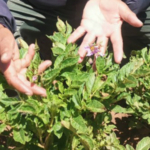


The CRFS has a portfolio of cross-cutting grants, as well as a set of cross-cutting themes that address topics of interest across the program. Cross-cutting grants are described below, while cross-cutting themes, described to the right, are supported by thematic groups as well as discussions and meetings carried out at the program and regional levels.
Cross-cutting grants support all three CRFS regions and/or address key program themes. The CRFS portfolio contains three types of cross-cutting grants.
Click here to see a graphic depiction of our Thematic Buckets of CRFS Active Projects.
Agricultural biodiversity contributes to productivity, resilience and diets. Over the past decade, CRFS-funded teams have conducted research across the value chains of diverse crops. Read more here.
The basis of agricultural productivity, soil health is essential for healthy diets and thus for human health. Organic matter is the engine of soil health, so it is critical to planetary health through carbon sequestration and ecosystem services. Read more here.
Smallholder farmers face substantial challenges from the diverse insects and pathogens that attack their crops and the weeds that compete with or feed on them. Read more here.
By the Numbers
An annual growth rate of 0.4 percent in the soil carbon stocks, in the first 30–40 cm of soil, would significantly reduce the CO2 concentration in the atmosphere.
Along with 28 other philanthropic foundations, the McKnight Foundation, through the CRFS, is part of the Global Alliance for the Future of Food.
The cross-cutting portfolio’s 26 projects contribute to global dialogues relating to agroecological transformation and global food security.